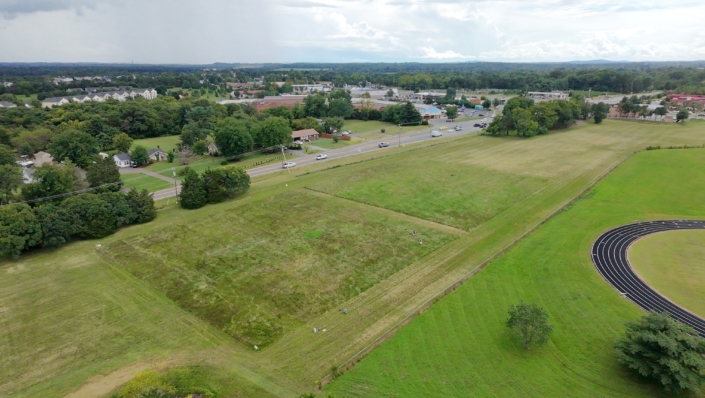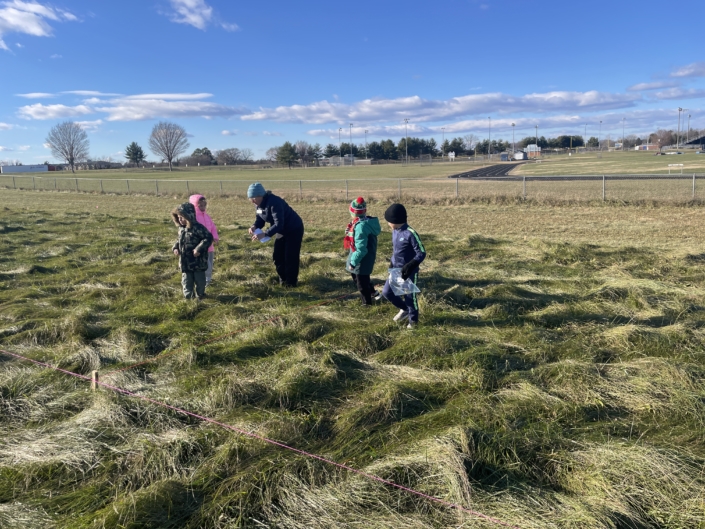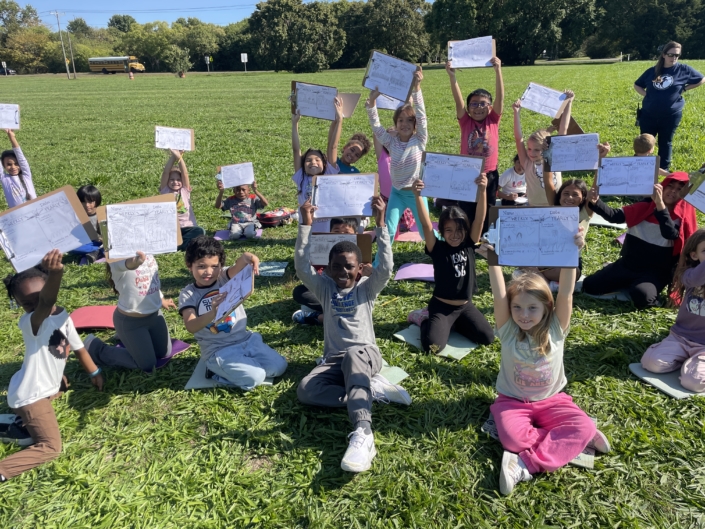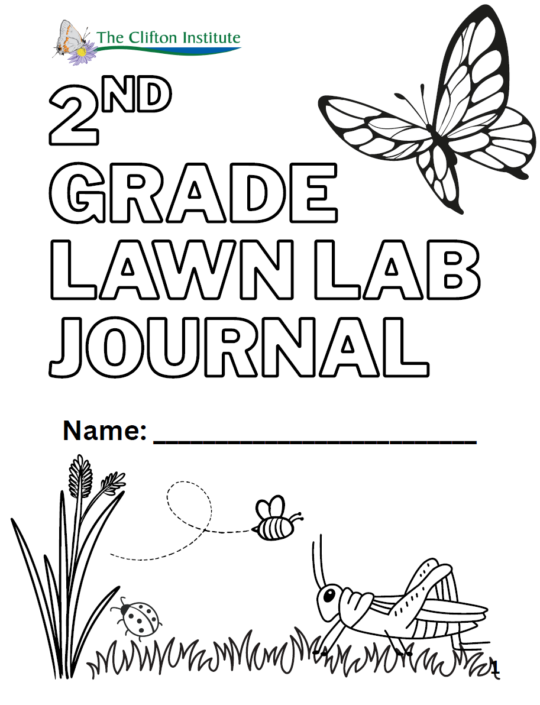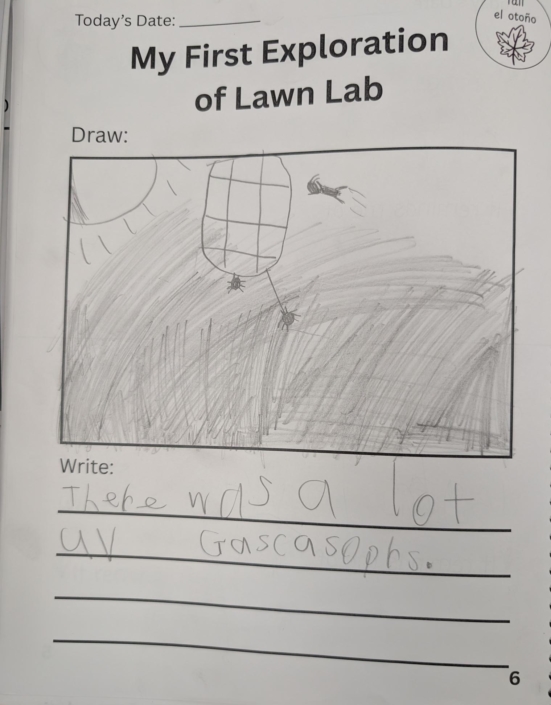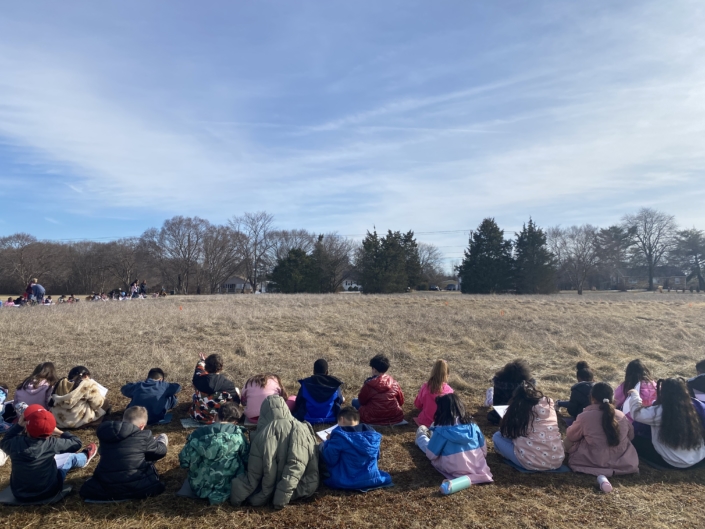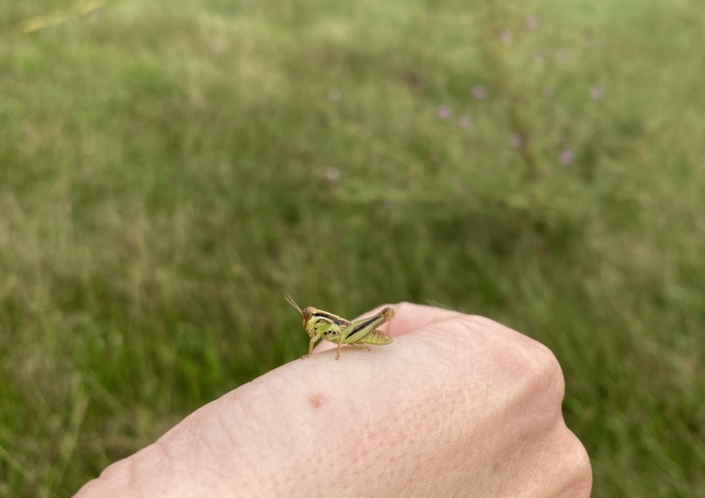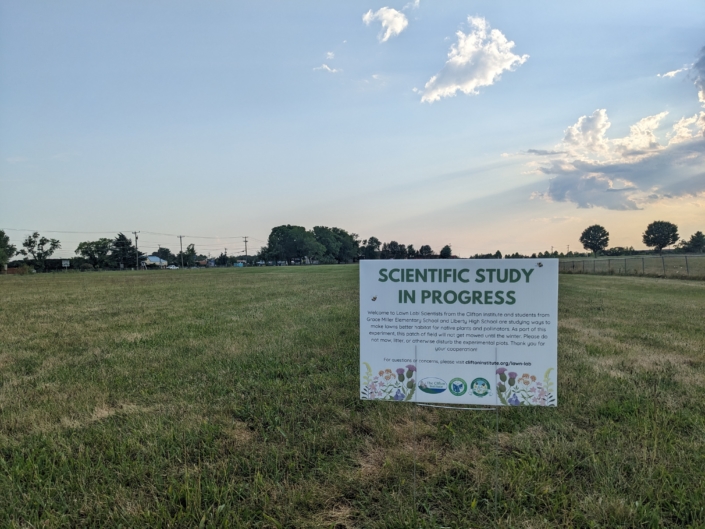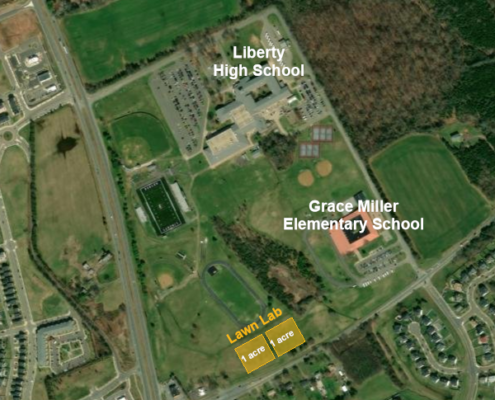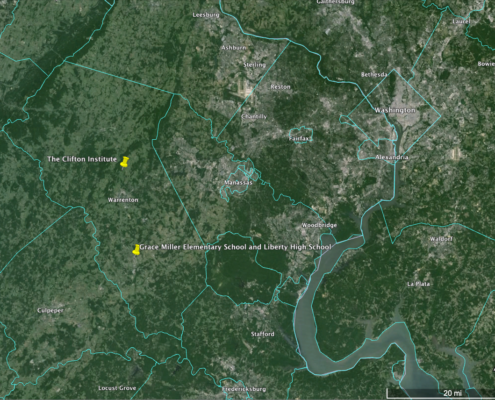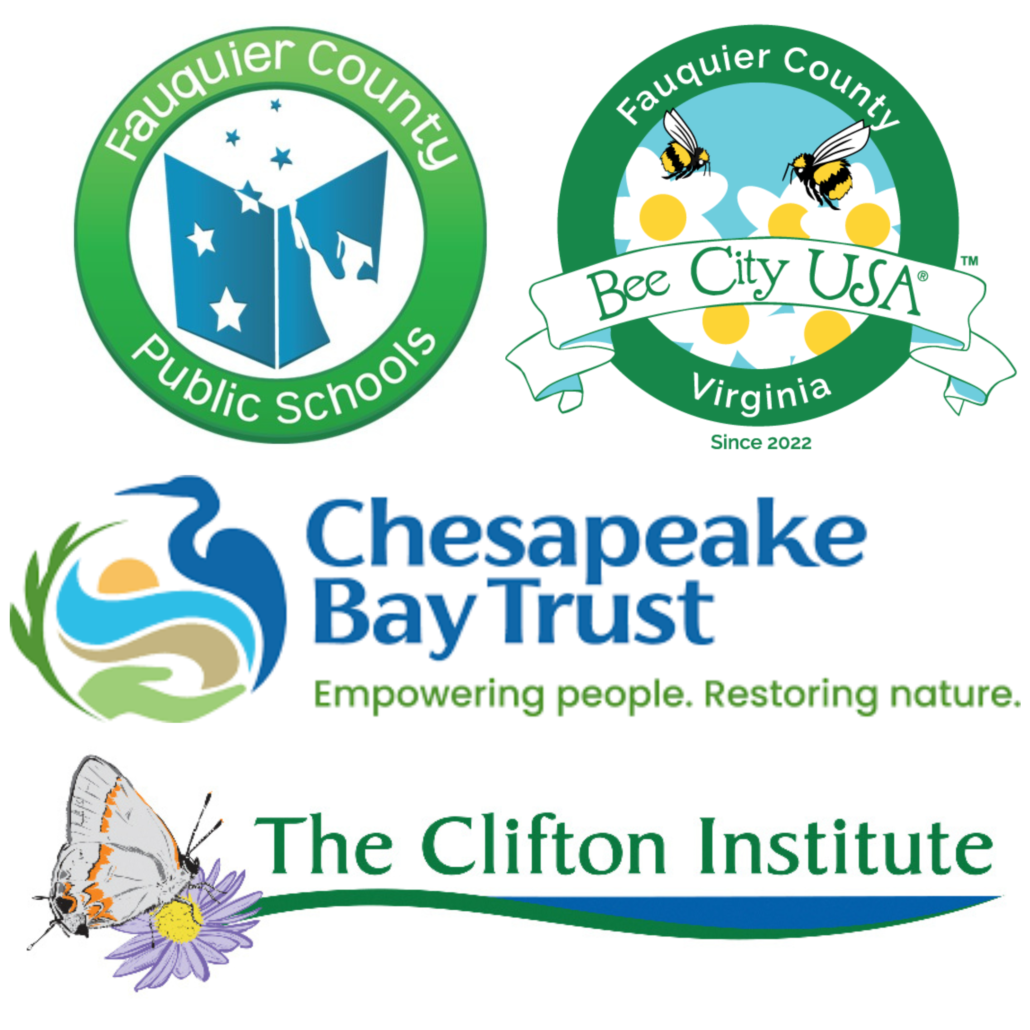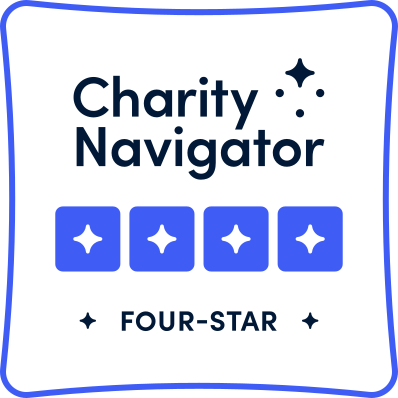A Hands-on Educational Experience To Improve Pollinator Habitat and Teach K-12 Students How to do Science
Started in 2024, Lawn Lab is a long-term habitat restoration experiment and partnership between the Clifton Institute, the Fauquier County Public School system, and Fauquier County’s We Need Bees Committee, which oversees the county’s status as a Bee City USA affiliate. Our current project is based on the campus of Liberty High School and Grace Miller Elementary, where students, along with educators and scientists from the Clifton Institute, will study the effects of reducing mowing on the biodiversity of lawns. Two one-acre squares of an old playing field (see map below) will be mowed only once a year in the winter, while an adjacent one-acre square will be mowed once a week as usual. Students will compare the species of plants and animals in the long grass (mowed once in winter) and those in the nearby short grass (mowed weekly spring through fall). Ultimately, the lessons students learn from this experiment will help inform the county, our wide network of landowners, and the scientific community with whom we’ll share our results on how to transform under-utilized stretches of lawn into habitat for native plants and animals. Because of Lawn Lab,
- Hundreds of students get outdoors and connect with the plants and animals in their backyard
- Virginia Standards of Learning concepts (life cycles, food webs, succession) and skills (making observations, conducting scientific investigations, analyzing data, drawing conclusions) are reinforced through hands-on experiences doing authentic scientific research
- FCPS reduces the money they spend on groundskeeping and the emissions caused by mowing
- Scientists, teachers, students, government officials, groundskeepers, and community partners come together to improve pollinator habitat in Fauquier County.
FAQ’s:
Why change how often lawns are mowed?
Green, short-mown lawns have become part of the suburban aesthetic and blanket the areas surrounding our homes, libraries, churches, and, of course, our schools. However, there is growing evidence that lawns are dead-zones for biodiversity. Few other plants can survive constant cutting and lack of plant diversity means lack of insect diversity. Native bees and butterflies have no flowers to drink from or plants to lay eggs on. If there are no baby butterflies (caterpillars), birds have nothing to feed their chicks. Maintaining lawns requires a huge amount of water and landowners often use herbicides, pesticides, and fertilizers that end up in waterways. Additionally, mowing lawns costs money: paying groundskeepers to mow fields, maintaining lawn mowers and weed whackers, and buying gas. The EPA estimates that 5% of the country’s air pollution comes from lawn mowers.
It’s just two acres. What difference can that make?
Even just two acres can be home to a surprising abundance and diversity of native wildlife. When we did plant surveys across the Piedmont region of Virginia, plots near the Lawn Lab site were some of the most diverse plant communities we found, so we’re excited to see what plants we can support here. But beyond the two acres of Lawn lab, our goal is for the site to serve as a demonstration to the community of the benefits of mowing less often and to use the data the students collect to figure out how to manage land better. At the Clifton Institute, we have a full-time staff member who provides free property visits to advise landowners on land management for wildlife in a fifteen-county service area. Over the last three years we have met with more than 200 people who manage more than 8,000 acres. We will update the advice we give in the future once we have the data from the Lawn Lab surveys. In total, the data collected by the students could improve thousands of acres of habitat.
Won’t long grass mean more ticks, snakes, and bees?
Part of making a better habitat for plants and animals you like means that it will become better for the ones you don’t like, too. Better habitat is just better habitat. The good news is that ticks can’t fly or jump, so unless you walk through the tall grass it is unlikely you will get ticks from it! That being said, a 2019 study of Black-legged (deer) ticks and mowing regimes found that there are just as many deer ticks in short grass as tall grass and that generally lawns don’t make for good tick habitat (Lerman & D’Amico 2019). The rule of thumb is that the more diverse a habitat, the less likely a single species will be able to take hold. Since lawns are generally low in diversity they can be hotspots for pests. Lastly, the reality is that if you spend time outdoors in Virginia, you are going to get ticks. The best way to avoid tick-borne illness is to check for ticks after any outdoor excursions from spring through late fall. You can learn more about tick safety here. As for snakes, there is very little evidence that tall grass harbors more reptiles than short grass. In fact, this study found that the taller the vegetation, the lower the snake diversity. The study also found that snakes were more abundant when woody debris was available, like shrubs or brush piles. The most commonly encountered and largest snakes at our field station just north of Warrenton are black rat snakes which are extremely docile and rarely bite even when handled. The good news is that snakes help control the population of mice, which are vectors for Lyme disease. You can read about a local study of mice and Lyme here. And lastly: bees! Evidence from other studies shows that reducing mowing will indeed increase the numbers of bees. And that’s a good thing! After all, Fauquier County is a bee city and has pledged to make better habitat for these valuable and charismatic pollinators. Social wasps (like yellow jackets) and social bees (like the non-native honey bee) tend to be the ones that sting people, usually because we’ve gotten too close to a nest full of thousands of individuals, which is worth their time and effort to defend. Most species of bees are solitary, meaning they lay a single egg, which is then abandoned to grow up on its own. A bee or wasp that seems like it is chasing you probably just thinks you look or smell like a flower. It’s a compliment! As with almost all animals: if you don’t make them feel threatened, they have no reason to defend themselves. Of the many (MANY) insect programs that we have run over the years, we can count on one hand the number of students who have gotten stung by bees. *Lerman SB, D’Amico V. Lawn mowing frequency in suburban areas has no detectable effect on Borrelia spp. vector Ixodes scapularis (Acari: Ixodidae). PLoS One. 2019 Apr 3;14(4):e0214615. doi: 10.1371/journal.pone.0214615. PMID: 30943238; PMCID: PMC6447176.
Will this affect the cross country track or any other athletic programs?
A 15ft strip will be maintained around all edges of the Lawn Lab squares to allow for the cross country track to continue in its normal spot. A wider edge is given on the playing field side of the field side so that the fence has plenty of space near it to be maintained.
What is the timeline for this project?
Mowing of the two 1-acre plots stopped on June 11th 2024. They will then be left to grow unmowed for the spring, summer, and fall and before being cut again in the following winter. Our goal is for this project to continue in perpetuity, as the plant community is expected to change after each year of the reduced mowing regime. Students who study the plots in 2nd grade and then again in 12th grade will see what a difference 10 years can make and experience the true pace of ecological change. In the future we may add an additional layer to the experiment by planting native plants in one of the one-acre squares and comparing the biodiversity in that plot over time with one that simply allows for native plants to come up from the existing seed bank or arrive on their own on the wind, through bird poop, or on the fur/clothes of animals. This is the first Lawn Lab site, but we are also hoping to add additional FCPS sites so that students can compare results with peers at other schools.
How can I get involved?
Thank you for your interest in helping Lawn Lab! The easiest way to help is to visit the Lawn Lab sites (there are walking trails around the Liberty High School campus) and to document the biodiversity that you find. Download the iNaturalist app, become a member of the Lawn Lab project, and upload photos of the plants and animals that you find. We plan to host events at Lawn Lab to teach the public how to identify plants and animals and to enlist your help in surveying the experimental plots. You can keep an eye out for upcoming programs by signing up for our monthly newsletter or by checking out our events calendar. If you’d be interested in volunteering to help with kids’ education programs either at Lawn Lab or at the Clifton Institute property, contact Bridget at bbradshaw@cliftoninstitute.org. Like what you see at Lawn Lab? You could think about reducing how often you mow part of your own lawn.
Interested in Lawn Lab at your school or have questions about the project? Email Cheyenne Hawkins (chawkins@cliftoninstitue.org) at the Clifton Institute with any questions you may have. Please note that in the summer we are busy with summer camps and therefore the education staff is rarely in the office. Non-urgent matters may have a response time of 2-3 business days.
We are keeping track of the species we find at Lawn Lab with an iNaturalist project!
For more information about all of Clifton’s K-12 field trip offerings, please visit our field trip page.
We are grateful to be working with Fauquier County Public Schools and the Fauquier We Need Bees Committee on this collaborative project! We are also grateful for funding from the Chesapeake Bay Trust, the Kortlandt Fund, the Virginia Department of Conservation and Recreation, the Warrenton Garden Club, the Volgenau Foundation, and an anonymous donor for support for Lawn Lab.

